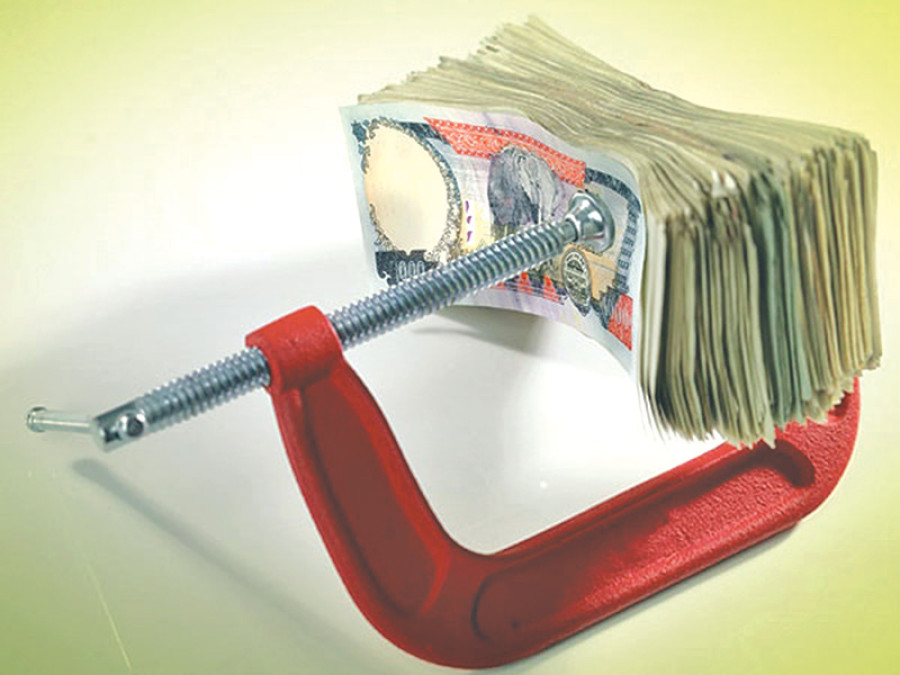Opinion
Shady business
Fraudulent cooperatives put the savings of thousands of depositors in danger
Niranjan Mani Dixit
Savings and credit cooperatives (SaCC), by providing a secure way for people with lower incomes to save their earnings with a healthy rate of deposit and allowing them to obtain credit at reasonable rates, have gained momentum worldwide as a method for poverty alleviation and economic growth. In Nepal, the Ministry of Cooperatives and Poverty Alleviation (MoCPA) is in charge of overseeing the performance of cooperatives as well as safeguarding and promoting people’s rights to financial services that are to be provided by cooperatives.
Unfortunately, the performance of many cooperatives has been less than satisfactory in recent years. The National Cooperative Federation of Nepal (NCFN), the umbrella organisation of cooperatives in Nepal, blames the failure of cooperatives on the lack of strict government regulation and monitoring. Additionally, cooperatives have been undermined by acts of fraudulence and the embezzlement of billions of rupees by managers. Such fraudulent acts committed by some cooperatives have tarnished the reputation of the entire sector. For lack of stern measures enforced by the federal government, thousands of depositors have become the victims of fraud and their money has not been returned. The case of Oriental Cooperative presents a critical instance of fraud in Nepal’s history of cooperative development.
Case of Oriental Cooperative
When Sudhir Basnet, chief of Agni Air and chairman of Oriental Cooperative and Oriental Housing and Builders, was taken into custody four years ago, over 100 depositors staged a demonstration in front of Hanuman Dhoka Police Station demanding that their money be returned. Prior to this, several protests had been staged outside the Oriental offices, but Basnet was reluctant to return the deposits. In July 2013, around 300 people who had deposited money in Oriental Cooperative picketed the Nepal Rastra Bank’s central office with an aim to pressure the government to tighten oversight of cooperatives. Depositors have accused the government of not taking the issue seriously, as this case involved more than 11,000 people, according to the Oriental Depositors’ Welfare Committee. They have also been demanding that the government should intervene and Basnet should refund their deposit money. Staging a sit-in protest outside the official residence of former Prime Minister KP Oli in Baluwatar in December 2015, victims of the Basnet fraud case asked that their deposits be refunded, and that the Cooperative Act be amended without further delay. They accused the government of delaying the process deliberately.
The depositors picketed the prime minister’s official residence again in June 2016, once again calling for action against the chief of Oriental Cooperative and with demands that their deposit amount be returned from the defaulter. The picketers also asked the government to pass the new Cooperative Act under which an Assets Rehabilitation Committee would be set up to recover the embezzled funds. They accused the government officials of trying to protect Basnet, who has been charged with embezzling more than Rs6 billion. Depositors suspect that the money has been siphoned out of the country, with embezzlers taking advantage of security lapses and a lack of stern action from the government. They say that some of the depositors have died of heart attacks and trauma due to misappropriation of their hard-earned money and the resultant shock.
Justice overdue
Basnet’s arrest on charges of fraud has exposed loopholes in the Nepali financial system. According to a report by a high-level probe commission formed by the government in September 2013 under the leadership of former Special Court Judge Gauri Bahadur Karki, a total of 12,962 people claimed that they lost Rs7.6 billion in deposits and Rs2.4 billion in interest in 150 cooperatives. Of the total claim, Oriental Cooperative alone owed Rs5.5 billion to around 11,840 account holders. The commission also recommended that the government address the issue in time. Depositors argue that if top level government officials and political leaders exercise their authority firmly, their deposits could be recovered from Oriental Cooperative.
In May 2016, the Finance Committee of the Legislature-Parliament instructed the government to recover collateral, and movable and fixed assets from Oriental Cooperative’s chairman, board of directors, officials, and senior staffers and their families. These funds would be used to return depositors’ money. The committee’s meeting also decided that the MoCPA, the Ministry of Finance (MoF) and Nepal Rastra Bank (NRB) should coordinate the process of returning depositors’ money from the defaulting cooperatives. The government is yet to implement the recommendations of the commission and the FCNP. Depositors believe the Supreme Court could also take necessary steps to expedite the process of ensuring ‘justice’ to victims.
The United Nations (UN), the World Bank (WB) and the International Monetary Fund (IMF) strongly believe that inclusive financial sectors to support savings and credit cooperatives can go a long way towards breaking the vicious circle of poverty. They believe that cooperatives can empower the poor and ensure that the poor have access to a wider range of financial services. However, the credibility of Nepal’s cooperative development initiatives has been questionable. Depositors of Oriental Cooperative believe that perhaps institutions such as the UN, the WB and the IMF can participate in these cooperative development initiatives and protect the interest
of depositors.
Dixit is an expert in integrated development issues




 12.99°C Kathmandu
12.99°C Kathmandu










